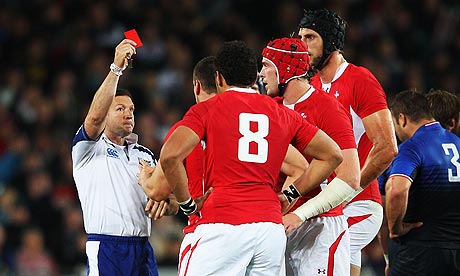
The danger, of course, is in the instant reaction. The desire to rant and rave at the unfairness of it all in the passion of the moment. A good job then that this article did not have to be written within minutes of the final whistle of Saturday's World Cup semi-final.
Then the blood was running. All those months of effort down the drain in the peep of a whistle and the brandishing of a red card. Confronted with a door, I would willingly have kicked it in. The apparent wrongness of the situation allowed no measure of thought; rational reasoning went out of the window the moment Alain Rolland showed Sam Warburton the card.
For the next 63 minutes emotion piled upon emotion, especially when it seemed that the impossible might be on; that 14 men might beat 15. Then the let-down of the final whistle. And if you'd asked me then, my judgment might have been very different from now. Given 24 hours, the chance is always that more mature thought might prevail.
Of course it still hurts. We've been at the races today rather than planning to play New Zealand in the final and that feels wrong. We should have been anticipating Wales's first World Cup final rather than our second third‑place play‑off.
But when it's been thought through, is there a chance that we – rugby union – could benefit from Saturday's lesson? How? Well, I've always looked to other sports for ideas to improve playing and coaching and would argue that sport in general has done well in borrowing across boundaries, even if what I'm about to suggest has personal difficulties.
I've always tried to avoid comparing and contrasting rugby league and union. League was then, union is now. But both codes have undoubtedly benefited from each other's experiences and I'm about to suggest that union might look to league in an effort to reduce the risk of getting things wrong in the heat of the moment.
That's not to say Rolland did get it wrong. The evidence says otherwise because the IRB on Sunday handed Sam Warburton a three-week ban, meaning it thought Rolland was spot on with his judgment. However, there are other issues at stake.
The first is that Rolland did not, to my knowledge, take the advice of either of his assistants before making a judgment that he would have known would have a dramatic impact – more than that of any player as it turned out – on the course of the game. The second was that, again to my knowledge, he didn't have the television match official in his ear giving his take on the severity of the issue. But the third – and the one I see as relevant to the future – is the lack of a fall-back position, other than waiting for the citing officer to report his conclusions 24 hours later.
OK, Rolland could have shown a yellow and waited to see whether the powers that be think he bottled it, but here league shows a middle way: putting a player on report. If there is an incident of punching, elbowing or butting, then the referee still shows a red card but (and it is a big but) only if he is 100% sure that it is a black-and- white issue. If he is unsure, even one iota, he can ask for the matter to be reviewed when a more rational judgment can be made.
How would that have affected Saturday? Well, I would suggest that it would give a little extra time for thought about the mechanics of the tackle and the effects of an immediate red card on the game.
Most people would understand that, if a big man tackles a small man or vice versa, the result is often that one or other gets lifted from the ground. According to the rules, the tackler then has a duty to return the airborne player to safety, rather than allow him to fall, which would make Warburton guilty even in the absence of malice.
The rule is absolute but I would also suggest fallible, as television later suggested in running half a dozen similar instances at the World Cup that did not result in red cards.
But here we get into the subjective. I would say the law tends to look an ass if it does not take circumstance into its reasoning and here the effects of Rolland's red card went far beyond the damage caused by one tackle from a man who doesn't have an ounce of malice in his body, an inspirational captain and one of the stars of the tournament who was genuinely confused to find himself ordered off after 17 minutes.
It has always seemed to me that the best refs are those who run a game almost without being seen. Or wanting to be seen for that matter. They just keep things ticking along, keeping the respect of players and stopping anarchy from breaking out in a complicated game. What I am suggesting is that Rolland's action – in threatening to end the spectacle of a World Cup semi-final – was a penalty that did not fit the crime and, given choice, he might have considered there was a better route to take.
As I say, the danger is in instant reaction.

